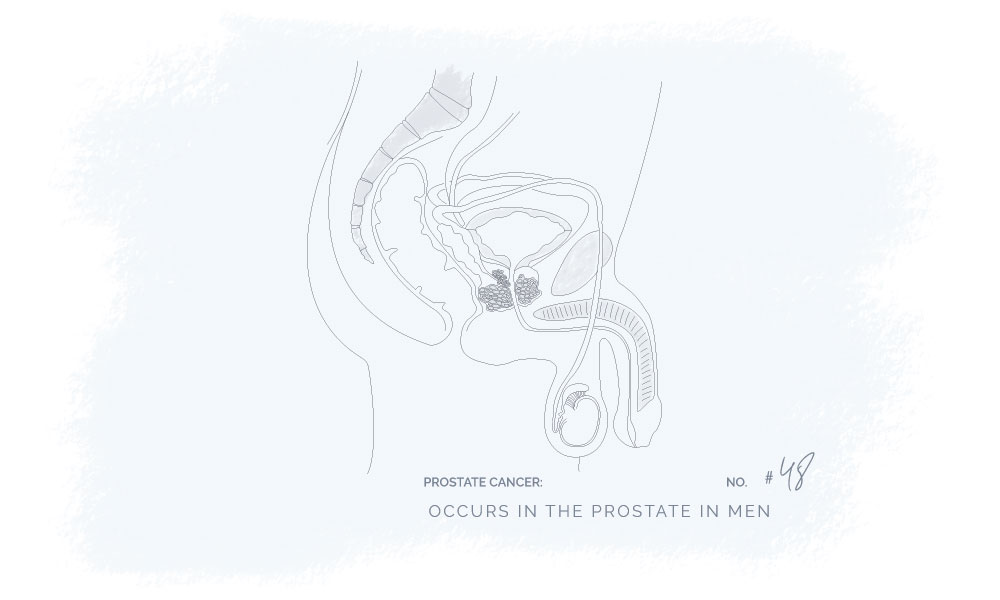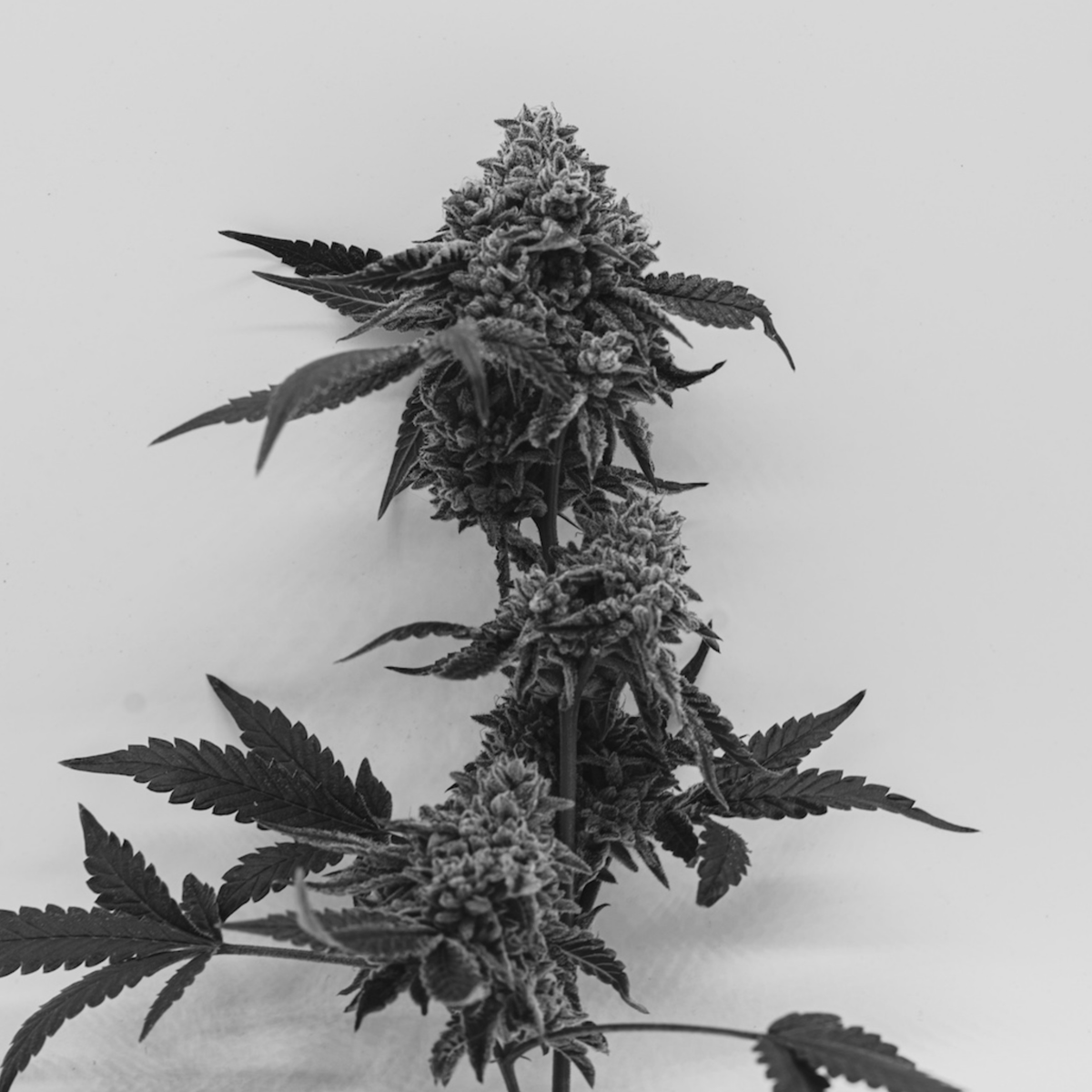
Prostate Cancer
Cancer

What is Prostate Cancer
Prostate Cancer is the most common type of cancer only found in males which take place in the prostate. The prostate is a gland that produces the seminal fluid that is a part of semen.
Symptoms
Prostate cancer may have no symptoms in earlier stages but if not detected early enough, cancer may cause:
- Difficulty urinating
- Reduced urine stream
- Blood in semen
- Erectile dysfunction
- Discomfort in the pelvic area
- Pain in bones
Cause
Currently, the exact cause of prostate cancer is not yet known. As other types of cancer, prostate cancer involves the growth of abnormal cells that contain mutations leading to uncontrollable cell division and growth. Similarly, it can spread and damage/destroy normal tissue. Factors that can increase the risk of prostate cancer are:
- Age
The risk of prostate cancer increases with age - Race
Research has shown that prostate cancer is more common and progressive in black men - Heredity
Family history may increase the risk of prostate cancer development
- Obesity
Progressive prostate cancer is more likely in obese men
Prostate Cancer Symptoms
Difficulty urinating, blood in semen, and erectile dysfunction among others.
Therapeutic Potential
Preclinical data suggests CBD and THC among other cannabinoids may be therapeutic for Prostate Cancer.
Application options
Depending on your needs, the optimal type of application may vary. Find more information on our application options.
The connection between Cannabinoids & Prostate Cancer
Studies find that CBD and THC may have great therapeutic potential and may be used to help treat prostate cancer. CBD and THC are well-known cannabinoids, however, they do not have the same psychoactive effects. THC is psychoactive while CBD does not possess psychoactive effects. According to WHO guidelines, the cannabidiol CBD is generally well tolerated with a good safety profile.
Preclinical evidence proposes that the cannabinoids THC and CBD may be beneficial in the treatment of prostate cancer. This could be due to the high expression of both CB1 and CB2 receptors in prostate cancer cells, meaning that the endocannabinoid system is a possible target for treatments.

Literature Discussion
The literature discussion is an overview of the published results from scientific studies investigating if and how cannabinoids can be beneficial in the treatment of prostate cancer. The overview will be updated regularly to ensure the newest and most accurate information.
Expression of CB1, CB2, and TRPV1 receptors may be a prognostic factor
Prostate cancer cells highly express CB1 and CB2 receptors. High expression of these receptors was shown to increase in the most aggressive cancer cells.The expression of receptors such as CB1, CB2, and TRPV1 may be used as a prognostic factor in prostate cancer cells.
Cannabinoids may suppress prostate cancer cells
It was shown that prostate cancer cells can be suppressed by cannabinoids such as 2AG, anandamide, THC, and CBD via CB1 receptor inducing phosphatase-dependent apoptosis.
Cannabinoid receptors may have antiproliferative effects
In vivo and in vitro models of prostatic cancer cells, CB1 and CB2 antagonist also exhibit anti-proliferative activities.
It has also been reported that cell proliferation can be regulated by the novel receptor GPR55, .
Cannabinoid receptor-induced apoptosis and anti-proliferative effects can be regulated by Erk and Akt signaling pathways.
Furthermore, it was demonstrated that synthetic cannabinoids exhibit apoptosis and anti-proliferation activity through oxidative stress, PPARγ, , and CB1 receptors.
Clinical Trials
Clinical trials are research studies that examine new treatments and evaluate their effects on human health outcomes.
Today, we are not able to provide any clinical trials about cannabinoids and Prostate Cancer.
Cannabinoids & Receptors
Below you find the plant cannabinoids, cannabinoid receptors, and endocannabinoids that are associated with the potential therapy.
CBD
Cannabidiol (CBD) is a dominant cannabinoid in hemp. CBD does not possess psychoactive effects and does not make people high. CBD has been demonstrated to have potential as an alternative for several health-related conditions, including anxiety, pain, depression, among others.
THC
Tetrahydrocannabinol (THC) is a cannabinoid found in the cannabis plant. THC possesses psychoactive properties.
CB2
Cannabinoid receptors are located on the surface of cells in your body and they “listen” to conditions outside the cell. CB2 receptors are key players in the ECS. CB2 receptors are more abundant outside the nervous system, including cells of the immune system.
If you have any further information relevant to the connection between Prostate Cancer and cannabinoids or find any of the information inaccurate, outdated or incomplete please contact us here
References
- https://www.mayoclinic.org/diseases-conditions/prostate-cancer/symptoms-causes/syc-20353087
- https://ghmedical.com/endocannabinoid-system/diseases/prostate-cancer
- Orellana-Serradell, O., Et Al., (2015). ”Proapoptotic effect of endocannabinoids in prostate cancer cells”. https://pubmed.ncbi.nlm.nih.gov/25606819/
- Thors, L., Et Al., (2010). ” Fatty Acid Amide Hydrolase in Prostate Cancer: Association with Disease Severity and Outcome, CB1 Receptor Expression and Regulation by IL-4”. https://www.ncbi.nlm.nih.gov/pmc/articles/PMC2924377/
- Chung, S., Et Al., (2008). ” A high cannabinoid CB(1) receptor immunoreactivity is associated with disease severity and outcome in prostate cancer”. https://pubmed.ncbi.nlm.nih.gov/19056257/
- Czifra, G., Et Al., (2008). “Increased expressions of cannabinoid receptor-1 and transient receptor potential vanilloid-1 in human prostate carcinoma”. https://pubmed.ncbi.nlm.nih.gov/18830626/
- Fowler, C., Et Al., (2012). ” Tumour epithelial expression levels of endocannabinoid markers modulate the value of endoglin-positive vascular density as a prognostic marker in prostate cancer”. https://pubmed.ncbi.nlm.nih.gov/23262399/
- Petrocellis, L., Et Al., (2013). ”Non-THC cannabinoids inhibit prostate carcinoma growth in vitro and in vivo: pro-apoptotic effects and underlying mechanisms”. https://www.ncbi.nlm.nih.gov/pmc/articles/PMC3570006/
- Mimeault, M., Et Al., (2003). “Anti-proliferative and apoptotic effects of anandamide in human prostatic cancer cell lines: implication of epidermal growth factor receptor down-regulation and ceramide production”. https://pubmed.ncbi.nlm.nih.gov/12746841/
- Nithipatikom, K., Et Al., (2004). “2-arachidonoylglycerol: a novel inhibitor of androgen-independent prostate cancer cell invasion”. https://pubmed.ncbi.nlm.nih.gov/15604240/
- Sreevalsan, S., Et Al., (2011). “Induction of apoptosis by cannabinoids in prostate and colon cancer cells is phosphatase dependent”. https://pubmed.ncbi.nlm.nih.gov/22110202/
- Pinero, R., Et Al., (2010). “The putative cannabinoid receptor GPR55 defines a novel autocrine loop in cancer cell proliferation”. https://www.semanticscholar.org/paper/The-putative-cannabinoid-receptor-GPR55-defines-a-Pi%C3%B1eiro-Maffucci/422a1be5db92862b1e1bffc5a97f7cea78a8482c
- Ciproano, M., Et Al., (2013). ”Association between Cannabinoid CB1 Receptor Expression and Akt Signalling in Prostate Cancer”. https://journals.plos.org/plosone/article?id=10.1371/journal.pone.0065798
- Sarfaraz, S., Et Al., (2006).” Cannabinoid receptor agonist-induced apoptosis of human prostate cancer cells LNCaP proceeds through sustained activation of ERK1/2 leading to G1 cell cycle arrest”. https://pubmed.ncbi.nlm.nih.gov/17068343/
- Morales, P., Et Al., (2013). “Synthetic cannabinoid quinones: preparation, in vitro antiproliferative effects and in vivo prostate antitumor activity”. https://pubmed.ncbi.nlm.nih.gov/24141201/
- Sarafraz, S., Et Al., (2005). “Cannabinoid receptor as a novel target for the treatment of prostate cancer”. https://pubmed.ncbi.nlm.nih.gov/15753356/
